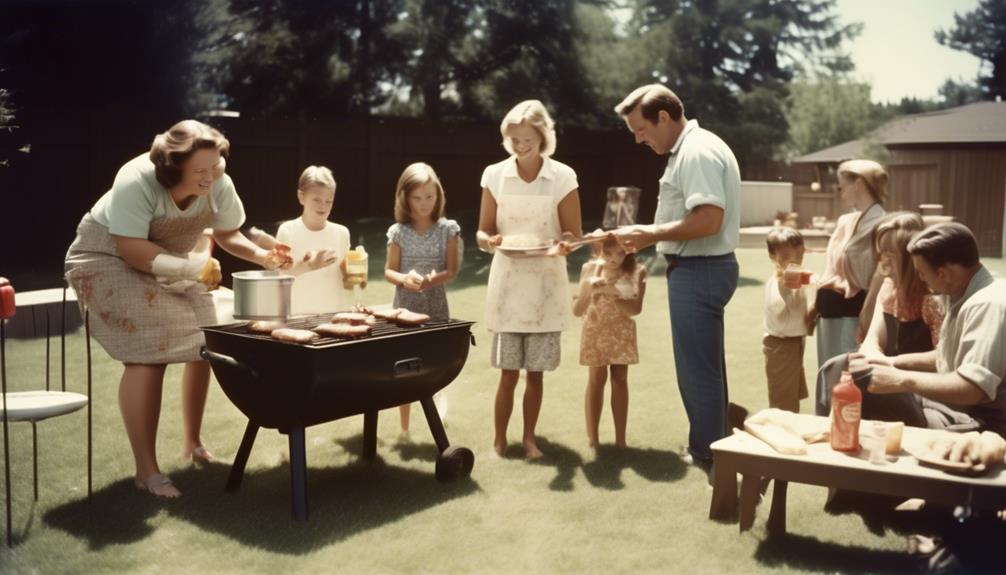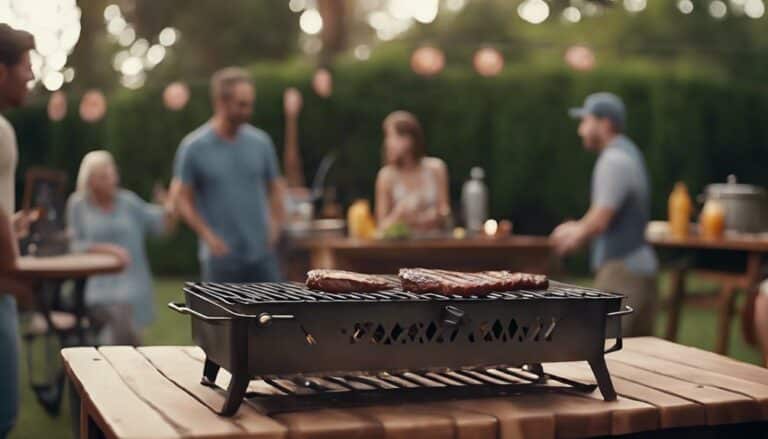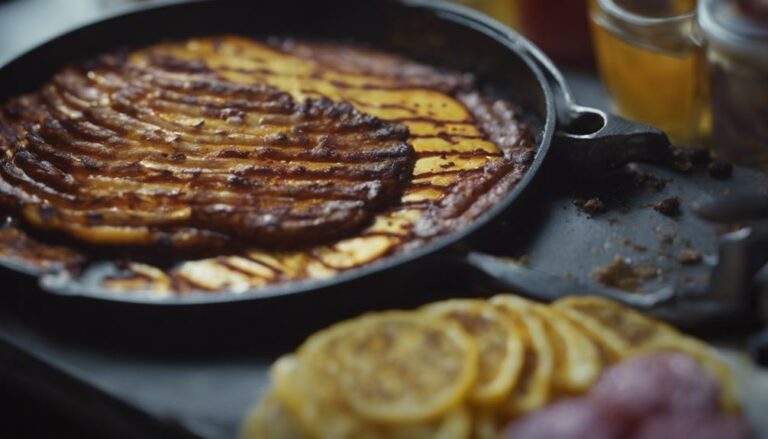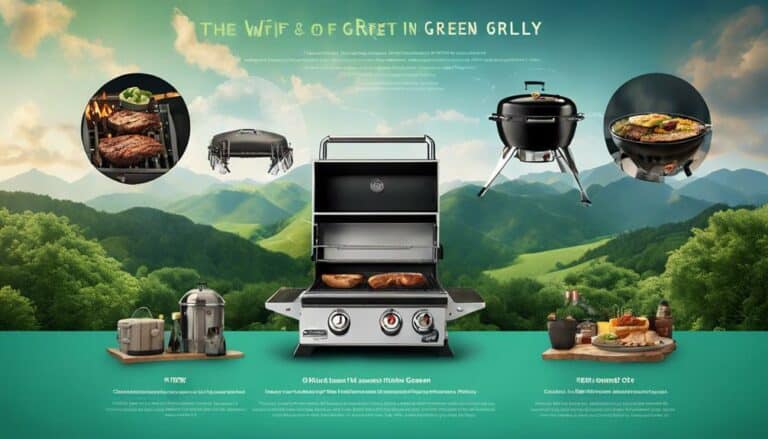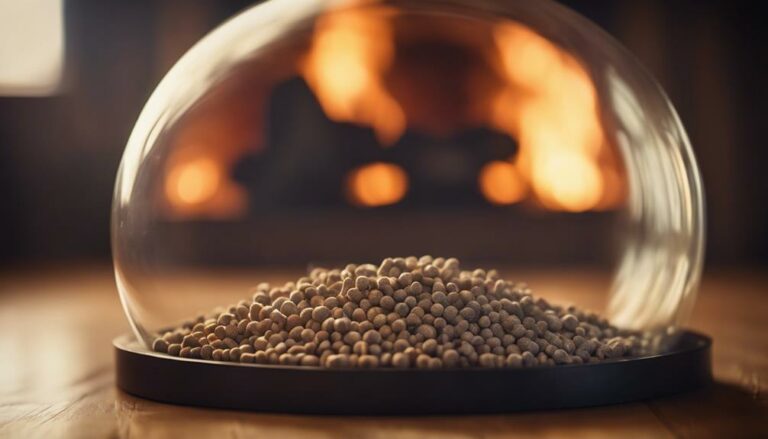Table of Contents
As the warm weather approaches, many people are gearing up for outdoor barbecues and gatherings. However, it’s essential to remember that safety should always be a top priority when it comes to outdoor grilling.
From checking for gas leaks to keeping a safe distance from flammable materials, there are several crucial safety tips to keep in mind. Understanding these measures will not only ensure a successful and enjoyable outdoor barbecue but also guarantee the well-being of everyone involved.
Key Takeaways
- Handle flammables with care and never use an outdoor grill indoors
- Regularly maintain and clean the grill, including checking and replacing gas hoses
- Stay aware of surroundings and wear appropriate protective gear
- Follow proper fuel handling and ignition procedures, including ventilating the area and swapping propane tanks safely
Handle Flammables With Care
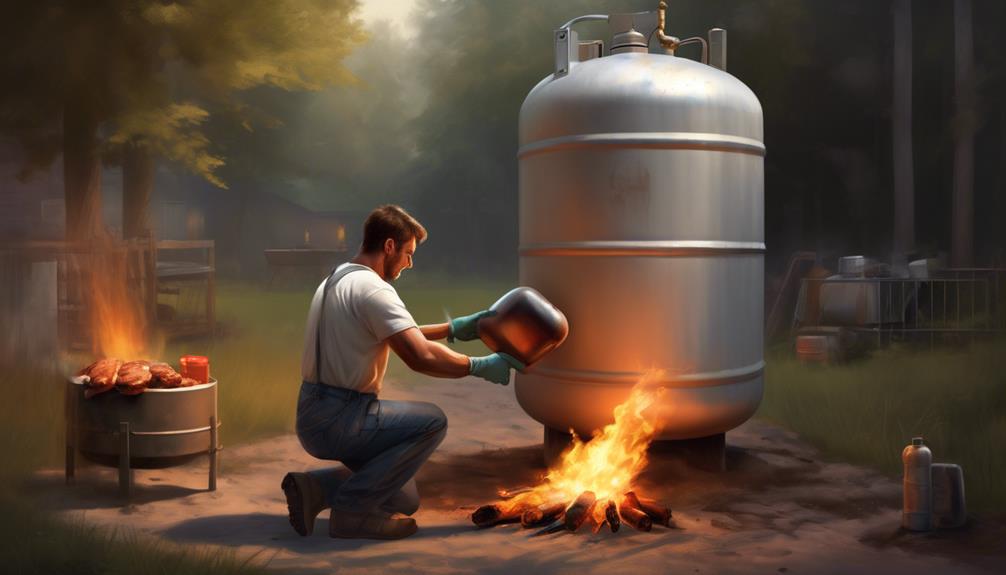
When handling flammables around a barbecue, it is crucial to exercise caution and follow proper safety measures to prevent accidental fires and injuries.
Proper flammable storage is essential to reduce the risk of fires. Flammable materials, such as paper towels and plastic utensils, should be kept away from the grill. They must be stored in a safe location, away from heat and flames, and it is important to follow the manufacturer’s instructions when using lighter fluid or charcoal starters. When using a charcoal grill, only charcoal starter fluid should be used to ignite the coals, and it should never be added to an already lit fire.
Additionally, it is important to use long-handled grilling tools to maintain a safe distance from the heat and flames. Investing in high-quality tools with heat-resistant handles can further mitigate the risk of accidents.
Moreover, caution should be exercised when handling and disposing of flammable materials like coals and ashes to prevent the risk of burns and fires.
Never Use an Outdoor Grill Indoors
Under no circumstances should an outdoor grill be used indoors, due to the risks of carbon monoxide buildup and fire hazards. Grilling indoors can lead to the accumulation of carbon monoxide, a colorless and odorless gas that can be fatal if inhaled in large amounts.
Additionally, the open flame and heat generated by a grill pose significant fire hazards indoors, especially in areas with limited ventilation. The use of outdoor grills indoors not only violates safety guidelines but also increases the likelihood of carbon monoxide poisoning and the outbreak of fires.
To ensure the safety of individuals and property, it is imperative to strictly adhere to the recommended usage of outdoor grills, which includes operating them in well-ventilated outdoor spaces. By understanding and respecting the potential dangers associated with using outdoor grills indoors, individuals can effectively mitigate the risks of fire hazards and carbon monoxide buildup, thus promoting a safe and enjoyable outdoor barbecue experience.
Keep a Safe Distance
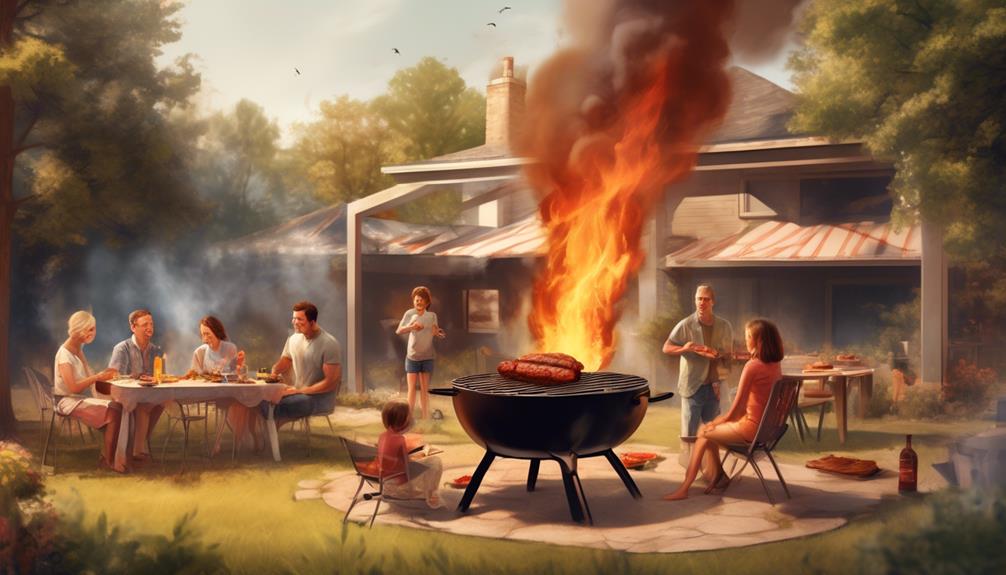
When it comes to outdoor barbecue safety, maintaining a safe distance is crucial.
This involves ensuring a safe cooking distance from any flammable structures and overhanging branches, as well as implementing fire safety precautions.
It’s also important to keep the grill’s surroundings clear of any potential fire hazards to prevent accidents.
Safe Cooking Distance
Maintaining a safe distance from the grill while cooking is essential to prevent burns and injuries. It’s crucial to use long-handled tools for handling food and adjusting the grill, ensuring a safe distance from the heat source.
Additionally, keeping children and pets at a safe distance from the grill is vital to prevent accidents and injuries. When cooking, be cautious of steam and hot surfaces, ensuring a safe distance when opening foil parcels or checking on the food.
By practicing safe cooking practices, such as staying close to the grill and focusing on the barbecue, you can further prevent accidents and injuries. This includes being mindful of safe cooking temperatures and preventing cross-contamination.
Following these guidelines will help ensure a safe and enjoyable outdoor barbecue experience.
Fire Safety Precautions
To ensure fire safety during outdoor barbecues, there are several important steps to follow.
First, it is crucial to maintain a safe distance between the grill and surrounding structures. Position the grill in an open area with proper ventilation and away from potential fire hazards.
Next, when lighting the grill, it is essential to keep the grill lid open. This helps to prevent propane accumulation and potential explosions.
Another important precaution is to stay within sight and reach of the grill at all times. This allows for quick responses to potential dangers and helps to prevent accidents.
Additionally, creating a safe zone around the grill is crucial. Make sure that children and pets are not allowed near the grilling area to minimize the risk of accidents.
Finally, it is important to use appropriate fire safety equipment. This may include having a fire extinguisher nearby and knowing how to use it.
Clear Grill Surroundings
Positioning the grill in an open area with proper ventilation and away from potential fire hazards is crucial for maintaining a safe distance between the grill and surrounding structures during outdoor barbecues. To ensure fire prevention and a safe outdoor cooking environment, consider the following:
- Maintain a clearance of at least 10 feet between the grill and any structures or combustible materials.
- Avoid grilling close to trees, overhanging branches, or under eaves to prevent fire hazards.
- Ensure the surrounding area is free from clutter, vegetation, and potential fire sources.
- Keep a safe distance from high-traffic areas and create a designated space for grilling.
Clearing the surroundings not only reduces the risk of accidents but also promotes a safe and enjoyable grilling experience for everyone involved.
Ensure That the Fire Is Completely Out
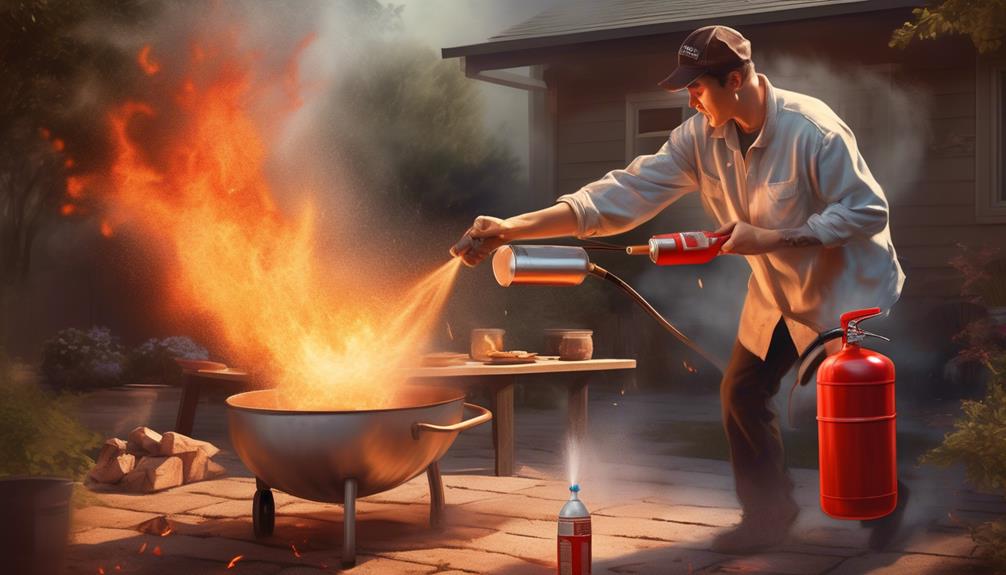
When it comes to outdoor barbecues, ensuring that the fire is completely out is crucial for safety. Properly extinguishing the fire using a fire extinguisher or water and allowing the charcoal to burn out and cool in a metal container are essential steps in preventing reignition.
It’s important to follow fire safety checks and proper extinguishing methods to avoid any potential hazards.
Fire Safety Check
Before leaving the grill unattended, it is crucial to ensure that the fire is completely extinguished and the coals are cool to the touch. This step is imperative to prevent any potential fire hazards.
To thoroughly conduct a fire safety check, the following measures should be taken:
- Use water, sand, or a fire extinguisher to extinguish the flames and coals.
- Wait until the ashes and coals are cool to the touch before disposing of them.
- Double-check all gas connections and turn off the propane tank for gas grills.
- Properly store the grill and any remaining fuel in a safe and secure location.
It’s important for individuals to have fire safety training and access to fire safety equipment to handle any potential fire incidents effectively.
Proper Extinguishing Methods
Using water or sand to thoroughly extinguish the coals and ensuring they are cool to the touch is crucial for outdoor barbecue safety. Proper disposal of hot ashes or coals is essential to prevent accidental fires. Avoid putting hot ashes or coals in combustible containers or near flammable materials. Always keep a fire extinguisher nearby and know how to use it in case of emergencies. Additionally, ensure that propane cylinders are properly stored in a safe, upright position and away from heat sources to prevent fire hazards. Following these proper extinguishing methods and fire safety equipment guidelines will help in ensuring that the fire is completely out and reduce the risk of accidents or injuries during outdoor barbecues.
| Proper Extinguishing Methods |
|---|
| Use water or sand to extinguish the coals |
| Ensure coals are cool to the touch |
| Properly dispose of hot ashes or coals |
| Keep a fire extinguisher nearby |
| Store propane cylinders safely |
Choose the Right Fire Extinguisher
To ensure optimal safety during outdoor barbecues, selecting a suitable fire extinguisher is essential for effectively addressing various fire hazards, including grease fires. When choosing the right fire extinguisher for outdoor barbecue activities, consider the following:
- Ensure the fire extinguisher is appropriate for extinguishing different types of fires, including grease fires.
- Familiarize yourself with the operation of the fire extinguisher and keep it in good working condition.
- Have the fire extinguisher readily available near the grill for quick response in case of a fire emergency.
- Prioritize grill safety by ensuring the availability and suitability of a fire extinguisher near the grilling area.
Proper maintenance of the fire extinguisher is crucial to ensure its functionality when needed. Understanding the different classes of fires and which type of fire extinguisher is suitable for each class is also essential. By having the right fire extinguisher and being knowledgeable about its usage, individuals can minimize damage and prevent injuries during outdoor barbecue activities.
Perform Regular Maintenance
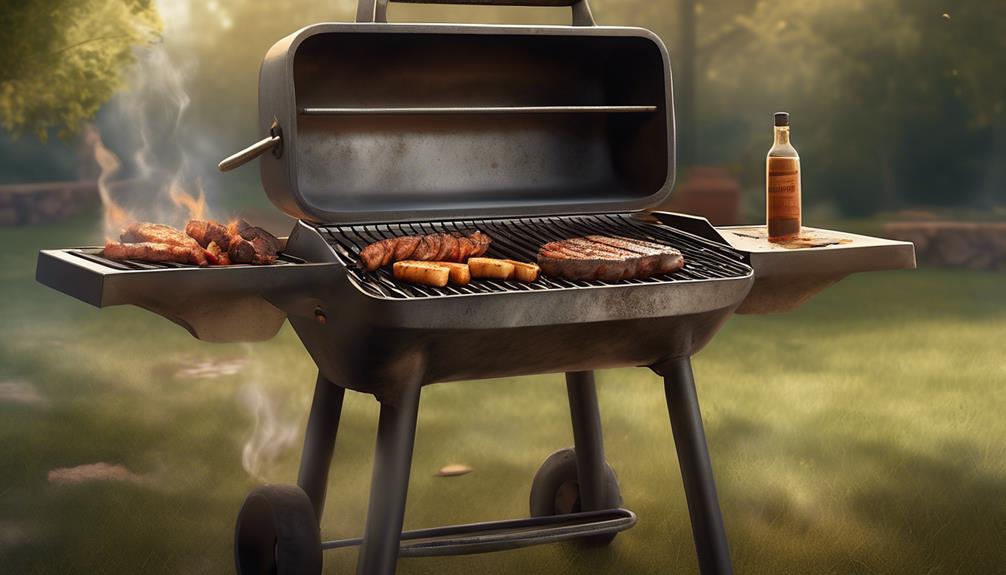
Regular maintenance of the grill is essential to ensure its ongoing safety and functionality, following the consideration of fire extinguisher selection for outdoor barbecue activities. It is crucial to schedule regular inspections of the grill to detect and address any wear and tear. Cleaning the grill after each use is imperative to prevent grease buildup that can lead to fires. Additionally, checking and replacing any damaged or worn-out parts is necessary to ensure the grill’s safety and functionality. Proper storage of the grill in a clean and dry area when not in use is vital to prevent corrosion or damage. Following the manufacturer’s maintenance guidelines is also essential to ensure the grill’s safe and efficient operation.
To emphasize the importance of regular maintenance, the following table highlights key maintenance tasks:
| Maintenance Task | Frequency |
|---|---|
| Inspections | Regularly |
| Cleaning | After each use |
| Part Replacement | As needed |
Clean the Grill Thoroughly
Thoroughly scrubbing the grill grates with a brush is essential to remove grease and food residue, ensuring a clean and safe cooking surface for your outdoor barbecue activities.
To maintain cleanliness and safety, follow these cleaning techniques and maintenance checklist:
- Use soapy water and a grill scraper to clean the interior and exterior surfaces of the grill. This will help remove any built-up grease and food particles.
- Pay special attention to the drip tray and clean it to prevent grease accumulation, which can lead to potential fires.
- Remove and clean any removable parts of the grill, such as burner covers and heat shields, to ensure thorough cleaning and maintenance.
- Regularly inspect the grill for any damaged or worn-out parts and address any issues promptly to maintain its functionality and safety.
Check and Replace Gas Hoses When Needed
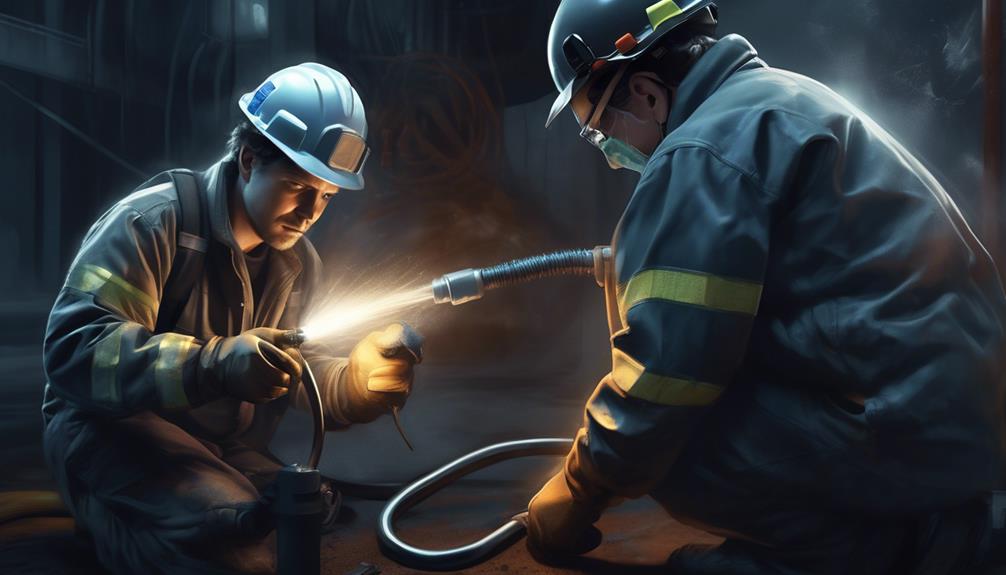
Inspecting and replacing gas hoses regularly is crucial for ensuring the safe and effective operation of your outdoor barbecue grill. Gas hose maintenance is essential to prevent potential hazards such as gas leaks and fire accidents.
It is recommended to inspect gas hoses for any signs of damage, including cracks, wear, or brittleness. Consider replacing gas hoses every 2-3 years, or sooner if any of these issues are detected. Properly installed and functioning gas hoses are fundamental for grill safety, and any identified problems should be addressed promptly.
Following the manufacturer’s recommendations for checking and replacing gas hoses is pivotal to maintaining a safe grilling environment. By being proactive in monitoring the condition of gas hoses, grill owners can minimize the risk of accidents and ensure the longevity of their barbecue equipment.
Prioritizing gas hose maintenance not only enhances safety but also contributes to the overall enjoyment of outdoor barbecue activities.
Stay Aware of Your Surroundings
When grilling outdoors, it’s crucial to stay aware of your surroundings to ensure a safe and enjoyable experience. Watch for potential hazards such as overhanging branches, dry grass, or flammable materials nearby.
Additionally, be mindful of the proximity of children, pets, and other individuals to the grilling area to prevent accidents or injuries.
Watch for Hazards
Remaining vigilant and aware of potential hazards is essential when grilling outdoors to ensure a safe and enjoyable experience. To stay safe, consider the following potential dangers and safety precautions:
- Stay aware of potential hazards such as overhanging branches or flammable materials near the grill.
- Be mindful of the ground conditions and any uneven surfaces that could lead to accidents.
- Keep an eye out for children or pets wandering into the grilling area to prevent accidents.
- Stay vigilant for sudden changes in weather conditions that could impact the grill’s safety.
Be Mindful of Others
Remaining vigilant and aware of potential hazards is paramount for outdoor grill safety. This includes being mindful of others’ presence and movements in the grilling area. It’s crucial to be considerate of fellow grillers and guests by avoiding distractions and maintaining focus on the grilling process.
Additionally, staying alert to high-traffic areas within the outdoor cooking space is essential to prevent accidents and ensure a safe environment for everyone. Choosing a location that provides visibility and easy access to the grill can help you stay mindful of other individuals in the vicinity.
Communicating with others about the need for attentiveness in the grilling area can also contribute to a safer and more enjoyable barbecue experience. By being considerate and attentive, you can help create a secure and welcoming atmosphere for all participants.
Wear Appropriate Protective Gear

To ensure personal safety while barbecuing outdoors, it is essential to wear appropriate protective gear. This includes heat-resistant gloves, an apron, long-handled grilling tools, closed-toe non-slip shoes, safety goggles, and a hat.
Choosing the right gloves is crucial to protect your hands and forearms from burns and splatters. Opt for gloves made from durable, heat-resistant materials such as leather or silicone. Ensure they provide a comfortable fit for ease of movement.
Additionally, wearing protective eyewear is of utmost importance to shield your eyes from potential splatters and smoke while grilling. Safety goggles with side shields provide the best coverage and protection.
When selecting footwear for outdoor barbecuing, closed-toe non-slip shoes are recommended. This helps prevent slipping and protects your feet from hot surfaces.
Lastly, consider wearing a hat to protect your head and hair from smoke and heat.
Store Fuel Tanks Properly
When storing fuel tanks, it is crucial to ensure they are kept in a well-ventilated area away from direct sunlight or heat sources.
Safe storage of fuel tanks is essential in preventing accidents and ensuring the overall safety of outdoor barbecue activities. It is imperative to keep fuel tanks upright and secure to prevent tipping or damage.
Additionally, storing fuel tanks outdoors, never indoors, is vital to avoid gas buildup and potential hazards. To further ensure safe storage, it is important to protect fuel tanks from physical damage and corrosion by using appropriate covers or storage containers.
Regular inspections of fuel tanks for leaks, damage, or signs of wear are also critical. Any identified issues should be promptly addressed to maintain safe storage and prevent accidents.
Follow Proper Ignition Procedures
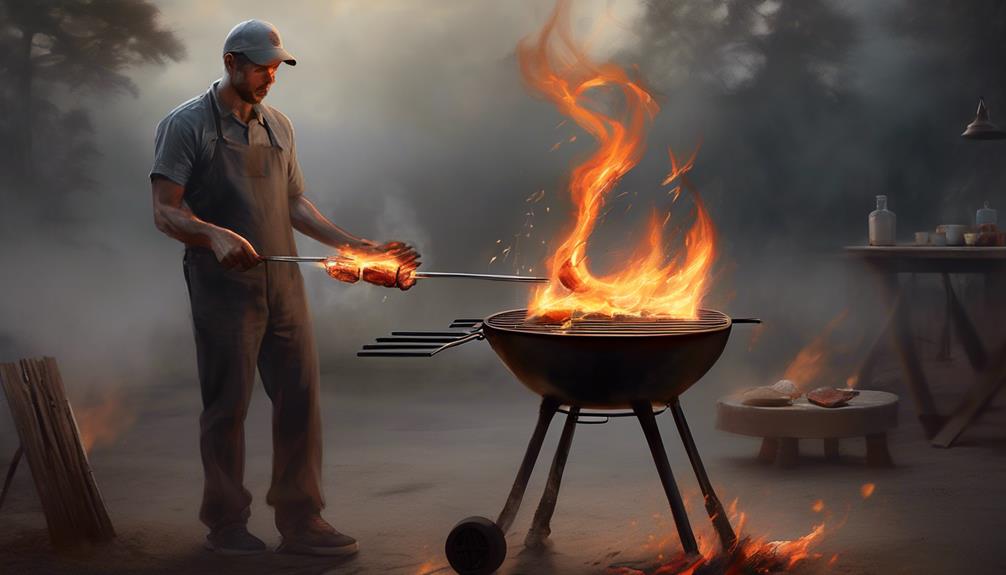
When it comes to igniting a grill, it’s crucial to follow proper procedures to ensure safety. This includes always turning on the grill with the lid open to prevent propane buildup and potential explosions, as well as positioning the grill on a stable, level surface to avoid accidents and spills.
Additionally, using long-handled grilling tools from a safe distance and avoiding ignition in enclosed areas are important steps to prevent injuries and hazards.
Safe Fuel Handling
Safe fuel handling during outdoor barbecue involves following proper ignition procedures to ensure the grill is used safely and efficiently. To guarantee safe fuel storage and proper fuel disposal, consider the following tips:
- Always check for gas leaks by applying a soap and water solution to the hose and turning on the propane tank before using the grill. Look for bubbles indicating a gas leak and ensure the grill is safe to use.
- Turn on the grill only when the lid is open to avoid propane accumulation, which can lead to explosions and severe damage to people and surroundings.
- Never leave the grill unattended once it’s lit, and keep it under constant supervision to respond quickly to any dangers.
- When handling the grill, always use long-handled grilling tools to keep a safe distance from the heat, preventing burns and injuries.
Ventilate the Area
To ensure a safe and efficient outdoor barbecue experience, proper ventilation of the area and adherence to the manufacturer’s guidelines for ignition procedures are essential, building upon the foundation of safe fuel handling.
The importance of proper ventilation cannot be overstated, as it prevents the dangers of gas accumulation. Before igniting the grill, it is crucial to ensure that the area is well-ventilated to prevent the buildup of dangerous gases, particularly in the case of propane leaks.
Following the manufacturer’s guidelines for proper ignition procedures is equally important, as it minimizes the risk of accidents. Always ignite the grill in open spaces with adequate airflow to prioritize safety and minimize fire hazards.
Be Cautious When Swapping Tanks
Exercise caution and ensure the propane tank is securely fastened and undamaged before swapping it onto the grill. Preventive measures and proper tank storage are crucial for a safe and enjoyable outdoor barbecue experience. When swapping out propane tanks, it is essential to follow specific safety guidelines to avoid potential hazards.
Here are some important tips to consider:
- Inspect the propane tank for any signs of damage or wear before connecting it to the grill.
- Check for leaks or unusual odors to ensure the integrity of the tank and prevent potential gas-related accidents.
- Always turn off the gas supply before disconnecting the old tank and attaching the new one to the grill.
- Exercise caution to prevent accidental spills or leaks when connecting the new propane tank to the grill.
Keep Children and Pets Away From the Grill
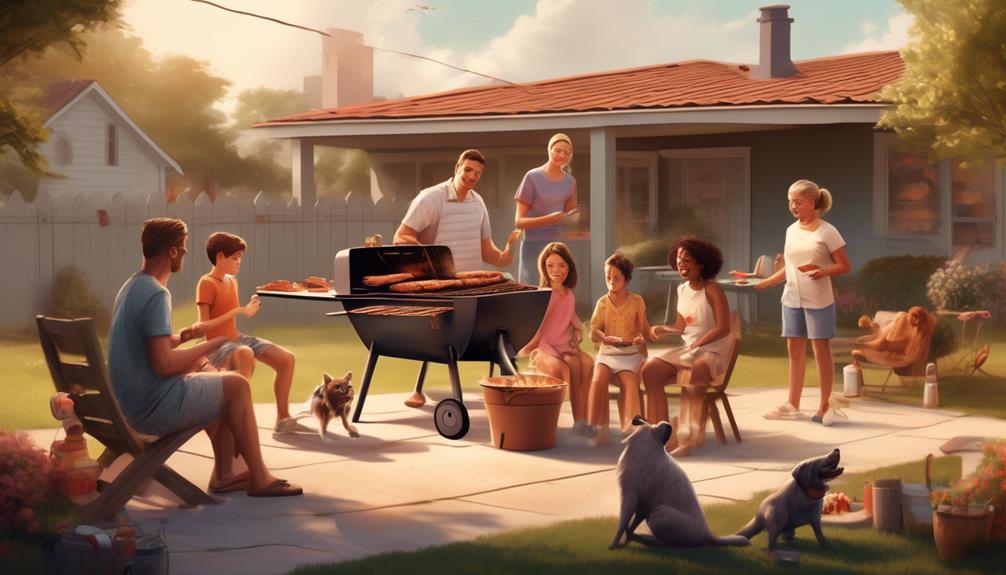
Children and pets should be kept at a safe distance from the barbecue grill to prevent accidents and ensure their well-being during outdoor gatherings. Implementing childproofing strategies and pet safety measures is crucial to avoid any mishaps. One effective way to ensure their safety is by creating a designated play area away from the grill and assigning a responsible adult to supervise them. Additionally, educating children about the dangers of the grill and establishing strict boundaries can also contribute to a safer environment.
| Childproofing Strategies | Pet Safety | Grill Maintenance & Cleaning Tips |
|---|---|---|
| Create a designated play area away from the grill | Keep pets on a leash or in a secure area | Regularly clean the grill and remove grease buildup |
| Assign a responsible adult to supervise children | Provide access to fresh water and shade for pets | Check for gas leaks and ensure proper ventilation |
| Educate children about grill safety rules and boundaries | Avoid feeding pets barbecue scraps | Inspect the grill for any signs of wear and tear |
Can Following Safety Tips for Outdoor Barbecue Fun Help Minimize Carcinogens in BBQ Food?
Outdoor barbecue fun can be enjoyed while taking necessary precautions to minimize carcinogens in BBQ. Following safety tips such as using lean meats, avoiding charring, and marinating food can help reduce the formation of harmful compounds, making your BBQ experience both enjoyable and healthier.
Practice Food Safety
When ensuring the safety of outdoor barbecues, it is crucial to not only keep children and pets at a safe distance from the grill but also to prioritize the practice of food safety. Proper food handling and preventing cross-contamination are essential for a successful and safe barbecue experience.
Here are some key practices to ensure food safety during outdoor grilling:
- Thaw meats safely in the refrigerator, not on the countertop, to prevent the growth of harmful bacteria.
- Use separate cutting boards and utensils for raw meats and ready-to-eat foods to avoid cross-contamination.
- Cook foods to their recommended internal temperatures using a meat thermometer to ensure they are safe to eat.
- Refrigerate leftovers promptly to prevent the growth of bacteria and foodborne illnesses.
Frequently Asked Questions
What Are the Safety Tips for Bbq?
Safe cooking and fire prevention are paramount during barbecues. Prioritize grill safety by checking for gas leaks, maintaining proper grill placement, and never leaving the grill unattended when lit. These measures significantly reduce fire hazards and ensure a secure outdoor cooking experience.
How Do I Keep My Grill Safe Outside?
Grill maintenance is crucial for outdoor safety. Regularly inspecting and cleaning the grill prevents fire hazards. A well-maintained grill not only ensures safe outdoor cooking but also extends the lifespan of the equipment, providing peace of mind for gatherings.
How to Safely Use a Bbq?
When using a BBQ, prioritize safety through regular maintenance and fire prevention measures. Clean the grill after each use, check for gas leaks, and keep a fire extinguisher nearby. Always follow manufacturer’s guidelines for safe operation.
How Do I Protect My Bbq?
To protect your BBQ, regular maintenance is essential. Keep it clean, inspect for rust, and replace worn parts promptly. Additionally, invest in a high-quality grill cover to shield the BBQ from the elements, preventing damage and prolonging its lifespan.
Conclusion
In conclusion, following safety tips for outdoor barbecues is essential to prevent accidents and ensure a fun and enjoyable experience for everyone involved.
For example, a family in Texas recently avoided a potential disaster by following the safety tip of checking their grill for gas leaks before use.
By taking simple precautions and being mindful of potential hazards, outdoor barbecues can be a safe and enjoyable activity for all.

